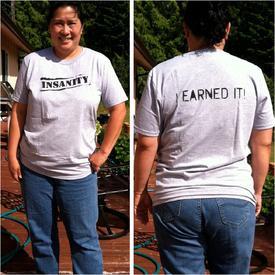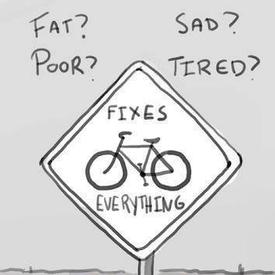HELP! Is my HRM over-estimating my calorie burn???

palmerar
Posts: 489 Member
I got a Polar FT4 HRM for Christmas, and I have been using it for all of my cardio workouts. My resting heart rate is in the high 60s, which is in the normal range, but it gets pretty high pretty fast while I am on the treadmill. I am using the chest strap and I have heard that HRMs are more accurate, but it seems like my calories burned are REALLY high. Last week I was alternating between walking very fast (4.5 mph) and jogging (6.5 mph) for 40 mins and got a total calorie burn of 502......could this be accurate or could my elevated heart rate be skewing my calorie burn???
Thanks for any insight!!
Thanks for any insight!!
0
Replies
-
Most monitors overestimate calorie burn. I usually just subtract 50-100 cal per workout to be safe.0
-
I got a little over 300 calories yesterday when I did 30 mins. I was walking for 1 minute at 2.8 and running for 5 mins at 4.8. I also have the FT4 and it sounds about right.0
-
Bump!
I have the same question! My heart rate during running is about 176-182. Calorie burn for 40 minutes is about 450. I use the Polar FT40. I've used the HRM from the gym but that also gives me the same heartrate. Is my HRM overestimating the calorie burn:huh: ??0 -
It's probably accurate. Chest strap monitors are very accurate. The more in shape you are... the lower your HR will be during equivalent workouts which will lead to less calories burned while in better shape.
Keep it up!0 -
That sounds way too high.0
-
It's probably accurate. Chest strap monitors are very accurate. The more in shape you are... the lower your HR will be during equivalent workouts which will lead to less calories burned while in better shape.
Keep it up!
Yes, they are very accurate for monitoring heart beats. Not calories. They really have no idea how many calories you burn.0 -
I thought mine was overcompensating as well, however, if you figure a minimum of 10 calories per minute, and you're not big at all, so you burn more, so say about 12-15 calories per minute, average 13 calories is 520 calories. so yeah, it's pretty accurate.0
-
I also have an FT4. Mine seems to be super accurate.0
-
yes.. subtract about 15-20%%%%0
-
I also have an FT4, and I find its accurate. it would make sense if you aren't fit.
ETA grammar errors :grumble:0 -
I have a FT7 and when I walk for about 30 min it says I burned about 240 depending on speed so if your running I would say it was accurate..0
-
I think it's accurate. I've got an FT60 myself and during running my heart rate is usually around 165-170. It depends on your fitness level and other things, but I think the calories displayed are pretty accurate.

For a 30 min run I burn around 350-400 cals.0 -
I have an FT7 and I would say no, go with what your HRM tells you. I've used mine for several different activities (running, water aerobics, stationary bike, elliptical) and it hasn't steered me wrong yet. In fact, it often matches up close to what the MFP database says I would be burning. The higher your heart rate, the more calories you're going to burn.
If you want to test it, try this. Go on an elliptical for 30 minutes and see what it says your calories burned are. Then look at your HRM. For me, the elliptical was overestimating my calories by at least 100 cals per workout. That was what convinced me to just stick to my HRM calories burned.0 -
for jogging running generally the harder your body works or higher your heart rate the more cals you burn. I average 10 calories per minute for my normal run about an hour 4 to 5 mile mph ( I am older and slower ) its 600 calories burned HR hits about 145 max I have both the FT40 and the FT 60 (long story) and the burn is very consistent with both
Your readings could be right and should continue to go down as your effort lessens and your conditioning improves0 -
It is very possible to burn 11-13 calories per minute doing intense cardio workout, but if you aren't really working that hard, then it probably isn't accurate.
I also have a very high end hr (max recorded is 201), if the calories burned don't seem to make sense, I tend to assign my own values...If I average 180+ bpm, I'm rocking it and assign a 12-13 cal per minute burn. If I'm in the 165-180's 10-11 cals per min. I rarely workout below that.
Or I just use the MFP/HR monitor values and only eat back a portion, say 50-60%.
Numbers are great and a good guide, but this isn't an exact science, you need to experiment and find what level of refueling makes you feel the best. If you eat back every calorie assigned and don't lose or you gain, try 90%, then maybe 80% and so on. If you cut back too far it will leave you feeling tired or hungry all the time, so add some back until you find your balance.
Good Luck0 -
The runners that I know who worry about calorie burn don't measure it by minutes. They measure it by miles. Mileage is a much more accurate way to measure calorie burn. The theory is, if you go fast and burn a lot of calories per minute, you get through your mileage quicker, thus giving you a fast but short calorie count. If you slow and don't burn so many calories per minute, it takes you a while to get a lot of burned calories, but you took a long time running your miles, so there you go.
For the average weighted person, it takes about 100 calories to go a mile, no matter your speed. Larger people take more calories. I burn about 110/mile. Lighter people take less. There are websites that do the calculations to tell you how many calories you burn per mile, based on your weight and/or BMI.
I suggest you consider switching to calorie burn based on mileage, not HR.
I hope this helps.0 -
I thought mine was overcompensating as well, however, if you figure a minimum of 10 calories per minute, and you're not big at all, so you burn more, so say about 12-15 calories per minute, average 13 calories is 520 calories. so yeah, it's pretty accurate.
What? Sorry but this is totally wrong. Bigger people tend to burn more calories because they have more weight to carry around. The opposite is true... A smaller person may burn more like 10 caloires per minute doing intense exercise but a heavier person would burn more like 12-13 calories per minute.
OP, that does sound a tad high to me but I'm also thinking with a higher resting hear rate you may not be as fit so your heart rate probably gets pretty high. What were you getting for a max heart rate? I'd also double check all your settings to make sure it's showing current info for you - gender, height, weight, age.0 -
I would say I am in "better than average" shape overall, but cardiovascularly I am probably on the lower end. I have a history of smoking, but quit a few years ago. While I have trained in dance, pilates and yoga for several years (all anaerobic) I am somewhat new to cardio exercise (within the last 3-4 years from a history of NO cardio exercise). I do have a lot of muscle and carry more weight than one might guess. My HRM and MFP are set for the correct age gender and weight, my weight accounts for a higher calorie burn. I work hard and sweat A LOT while doing cardio but the numbers still seem high. I think for now I will still use my HRM and will only eat back about 70-80%. Trijoe, I will definitely look into the calories per mile theory and see what the disparity is. Thanks everyone!0
-
I'm small and 55. My running burn is usually around 350 for 35 minutes so with your being younger your numbers sound about right. A HRM doesn't deduct BMR so if you really want to be safe you could deduct 50 calories or so from it.0
-
Sounds about right if your HR is that high.0
-
If your resting HR is that high (mine is 85) then your workouts are going to give you a greater burn because even a less intense workout is still going to really get your heart rate up. My resting HR used to be 104 and I could get a serious burn just from going for a walk because my fitness level was so low. As you progress, you'll note that your RHR decreases as you level of fitness increases...thus it becomes necessary to increase the intensity of your workouts to get the same burn or to get you working HR up to your desired %.
I find my HRM to be fairly accurate when I compare it to a VO2 calculator, if I knock off my BMR calories for that specific time to account for the calories that I would have still burned just sitting on my *kitten* for those 30 minutes...when I do that, I come within 10-20 calories of the VO2 calculators I've used.0 -
I have the low level Polar HRM that does not tell you calories burned, so I have to manually find out my numbers to enter them into MFP. I use this calculator:http://www.shapesense.com/fitness-exercise/calculators/heart-rate-based-calorie-burn-calculator.aspx That gives me the gross calories burned including my RMR, so then I have to enter that number into another calculator (they show you the link) to find out my net calories burned. That is the number I enter into MFP because MFP includes my resting metabolic rate.(calories you burn just for being alive.) So to answer the OP question, I'm not familiar with your HRM, but maybe it's possible it's giving you the gross number of calories burned instead of the net calories burned?0
-
The runners that I know who worry about calorie burn don't measure it by minutes. They measure it by miles. Mileage is a much more accurate way to measure calorie burn. The theory is, if you go fast and burn a lot of calories per minute, you get through your mileage quicker, thus giving you a fast but short calorie count. If you slow and don't burn so many calories per minute, it takes you a while to get a lot of burned calories, but you took a long time running your miles, so there you go.
For the average weighted person, it takes about 100 calories to go a mile, no matter your speed. Larger people take more calories. I burn about 110/mile. Lighter people take less. There are websites that do the calculations to tell you how many calories you burn per mile, based on your weight and/or BMI.
In agreement with this. I do use my HRM and it appears accurate. If I'm running on the treadmill, I'll generally burn about 80-90 calories per mile (regardless of speed). If I'm outside (hills, wind, etc), I'll generally burn 100-110 per mile. Yesterday on a 10 mile treadmill run, I burned 1,050 calories, whereas my husband, who weighs 80 pounds more than I do, ran 10 miles outside and burned 1650 calories. He's heavier, and he was outside.
I use my HRM (Garmin) to give me my calories and I do eat nearly all of them back. If my weight loss stalls, then I'll try eating fewer of them back. But right now, I'm averaging 2 pounds/week with only 15 pounds to go, so I'm not changing anything.0 -
I have the low level Polar HRM that does not tell you calories burned, so I have to manually find out my numbers to enter them into MFP. I use this calculator:http://www.shapesense.com/fitness-exercise/calculators/heart-rate-based-calorie-burn-calculator.aspx That gives me the gross calories burned including my RMR, so then I have to enter that number into another calculator (they show you the link) to find out my net calories burned. That is the number I enter into MFP because MFP includes my resting metabolic rate.(calories you burn just for being alive.) So to answer the OP question, I'm not familiar with your HRM, but maybe it's possible it's giving you the gross number of calories burned instead of the net calories burned?
That's what I was thinking was happening, that it was showing gross calories, where those are already accounted for in MFP. I used the link you provided and it lined up with MFP, both have my correct age weight and gender. This seems like what it should be! Thanks0 -
Here is a way to get a better idea on the accuracy
http://www.myfitnesspal.com/topics/show/774337-how-to-test-hrm-for-how-accurate-calorie-burn-is0 -
ThisThe runners that I know who worry about calorie burn don't measure it by minutes. They measure it by miles. Mileage is a much more accurate way to measure calorie burn. The theory is, if you go fast and burn a lot of calories per minute, you get through your mileage quicker, thus giving you a fast but short calorie count. If you slow and don't burn so many calories per minute, it takes you a while to get a lot of burned calories, but you took a long time running your miles, so there you go.
For the average weighted person, it takes about 100 calories to go a mile, no matter your speed. Larger people take more calories. I burn about 110/mile. Lighter people take less. There are websites that do the calculations to tell you how many calories you burn per mile, based on your weight and/or BMI.
I suggest you consider switching to calorie burn based on mileage, not HR.
I hope this helps.0 -
All of these calculators are based on estimates of estimates based on formulas arrived at by averages. What is most important is that whatever you do, you do consistently. Otherwise you won't know what to change when you don't get the results your expecting. If your eating back your exercise calories and not losing weight then try eating back less of your calories. If your eating half your calories and feeling tired then try eating back more of them.
You have to listen to your body and makes changes based its feedback. Don't make multiple changes at once and give changes a couple weeks to a month before changing again.
I love all the posts of my HRM is super accurate when in reality most people have no real idea if the HRM is accurate or not just that whatever they are doing is working therefore it must be accurate.0 -
I got a Polar FT4 HRM for Christmas, and I have been using it for all of my cardio workouts. My resting heart rate is in the high 60s, which is in the normal range, but it gets pretty high pretty fast while I am on the treadmill. I am using the chest strap and I have heard that HRMs are more accurate, but it seems like my calories burned are REALLY high. Last week I was alternating between walking very fast (4.5 mph) and jogging (6.5 mph) for 40 mins and got a total calorie burn of 502......could this be accurate or could my elevated heart rate be skewing my calorie burn???
Thanks for any insight!!0 -
I got a Polar FT4 HRM for Christmas, and I have been using it for all of my cardio workouts. My resting heart rate is in the high 60s, which is in the normal range, but it gets pretty high pretty fast while I am on the treadmill. I am using the chest strap and I have heard that HRMs are more accurate, but it seems like my calories burned are REALLY high. Last week I was alternating between walking very fast (4.5 mph) and jogging (6.5 mph) for 40 mins and got a total calorie burn of 502......could this be accurate or could my elevated heart rate be skewing my calorie burn???
Thanks for any insight!!
The HRM is probably correct. Jogging at ~7mph burns over 600 calories in a half hour.
Edit: The HRM _is_ estimating how many calories you have burned, but it is based specifically on your heart rate and heart performance during the given time period, which makes it very accurately when worn correctly.0 -
Going 4.5 to 6.5 mph for 40 mins is a nice high and steady clip. I've done that as well as you ramp up the CALORIE BURN totals fast! So i'd have to say that's very accurate (plus you had the chest strap on.) Yes, the devices record HR, but they have an algorithm that determines your calorie burn totals from your age and sex.0
This discussion has been closed.
Categories
- All Categories
- 1.4M Health, Wellness and Goals
- 398.1K Introduce Yourself
- 44.7K Getting Started
- 261K Health and Weight Loss
- 176.4K Food and Nutrition
- 47.7K Recipes
- 233K Fitness and Exercise
- 462 Sleep, Mindfulness and Overall Wellness
- 6.5K Goal: Maintaining Weight
- 8.7K Goal: Gaining Weight and Body Building
- 153.5K Motivation and Support
- 8.4K Challenges
- 1.4K Debate Club
- 96.5K Chit-Chat
- 2.6K Fun and Games
- 4.8K MyFitnessPal Information
- 18 News and Announcements
- 21 MyFitnessPal Academy
- 1.5K Feature Suggestions and Ideas
- 3.2K MyFitnessPal Tech Support Questions




















